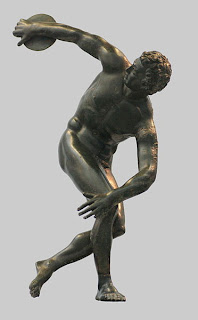The content of the athletic festival varied over its thousand-year history, but not much. The prestige of the Olympic Games was so great and their integration into Greek religious life was so taken for granted as to discourage tampering with their order and ritual(1)...
As the heralds arrived at each city-state or colony, they proclaimed a sacred truce. Thereafter competitors or spectators traveling to or from Olympia were under the official protection of Zeus. Considering the Greeks' combativeness, this truce was observed with remarkably few exceptions(2)...
Even before the end of the victory ceremonies for the jockeys, many in the crowd were leaving for the grassy slopes of the stadium to observe the finalists in the pentathlon. In classical times the five events were the discus throw, the long jump, the javelin throw, the sprint, and wrestling(5)...
Discuses were made of stone or were metal castings, and they were of various weights, though they would be standardized at an important meet. The discus thrower's technique was much like the rising spin familiar to modern athletes and fans(11)...
-from The First Modern Olympics, by Richard D. Mandell

No comments:
Post a Comment